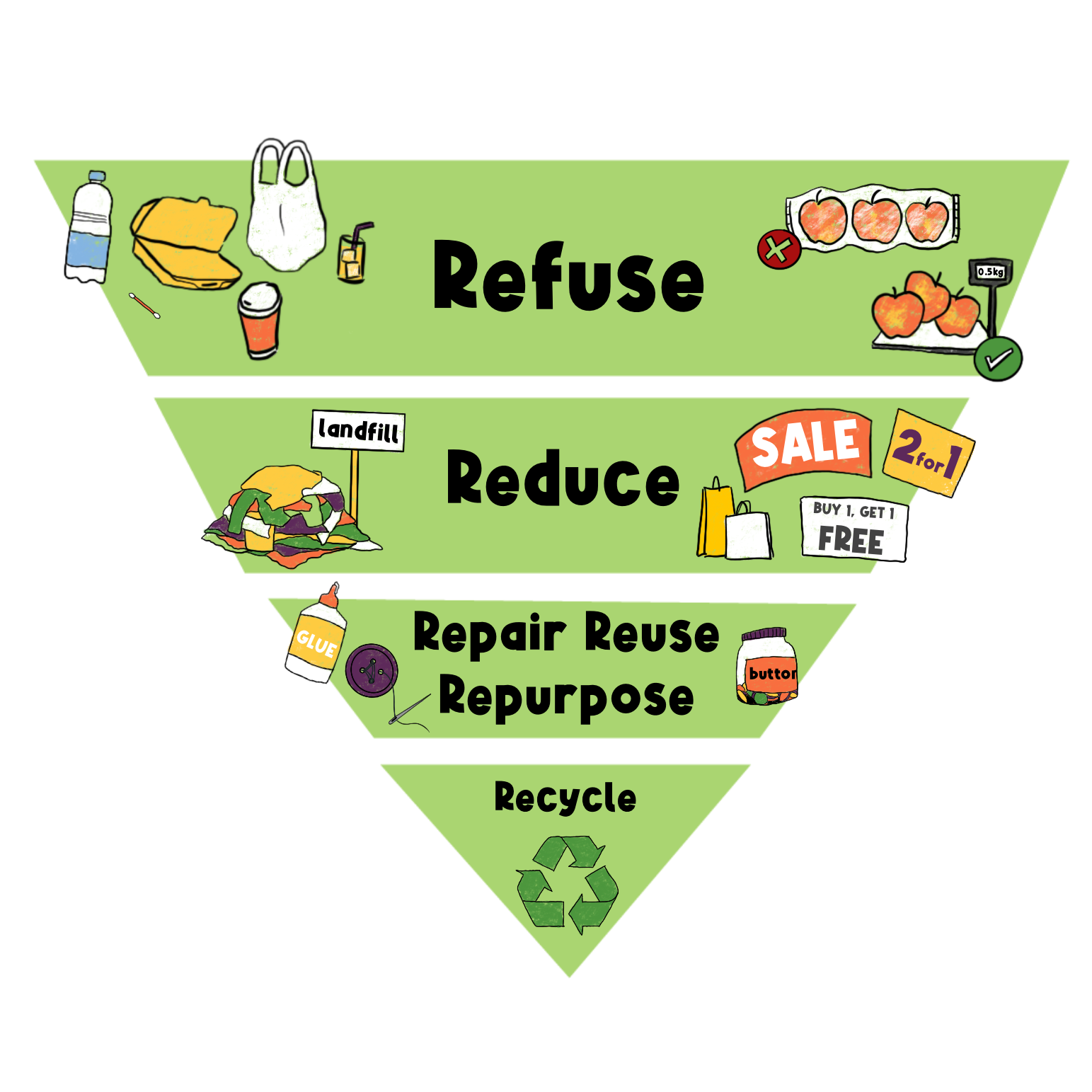Consumption: What can we do at home?
There are several easy ways we can reduce physical waste at home in the Meadows.
We can start by looking at a series of steps that we can implement into our daily actions and activities:
The Waste Hierarchy
Refuse - consume less, e.g. avoid fast fashion, refuse unnecessary packaging or single-use items, eg. loose veg instead of bagged veg
Reduce - share, rent, lease, borrow, find alternative products which last longer
Repair, Reuse, Repurpose – learn the skills at one of our DIY workshops, charity shops, sewing groups, Nottingham Fixers, crafting ideas
Recycle - learn what goes in home recycling bins, give stuff to charity, or sell on second-hand websites such as Gumtree, vinted, freecycle, or eBay
Rot – join our Climate Champions Community Composting Scheme, or learn how to compost at home.
Look at what you’re throwing away!
The good news is that UK non-recycled household waste is decreasing, and has halved since 2019.
This is due to improved recycling rates, which also show a strong recognition of the impact of our waste.
And it is not just physical goods, consider how other resources might be wasted at home, such as energy, fuel, water and food. We have articles on these topics online, as well as our knowledge bank at the Meadows Library.
How do you recycle items which cannot go in your recycling bin at home, such as clothes, electronics, plastic film packaging or juice cartons?
Check out a Recycling map to see how to recycle these items locally.
Household Challenge
Why not see how much further you can reduce your non-recyclable waste by checking how full your waste bin is on bin day? Work out what is being put in it.
Is there any other way to use, reduce or recycle this type of waste?
Check for success
See if you and your household can halve what is thrown away through the changes you make.
Think of how much less waste is being sent to landfill … and this is only from one household out of many!
Change one thing at a time
How do you change the habits of your household? For example, if you spot lots of crisp packets and soft plastics, you could recycle them at your supermarket next time you shop. Keeping a stash ready-to-take is a handy way of going about it.
It is often easy to just carry on as normal. Focusing on changing one thing at a time can be the simplest and most effective way.
Little changes can avoid sights like this!
If you’re keen to keep making changes and learning how reduce your waste, check out the further reading below:
We have the following books in our Knowledge Bank at the Meadows library:
‘Cradle to Cradle, Re-Making the Way We Make Things’ by Michael Braungart and William McDonough – explains how manufacturers can change their production models from ‘cradle to grave’ to ‘cradle to cradle’, to become more sustainable.
‘Time to Eat the Dog? The Real Guide to Sustainable Living’ by Robert & Brenda Vale – looks at how to live sustainably with finite resources during a time of a growing global population with increasing consumption.
‘How Bad Are Bananas?’ by Mike Berners-Lee. Full of fascinating and often surprising information about the embodied carbon emissions for everyday items, written in an entertaining way.
Also, further reading online:
Why shop ethically? | Ethical Consumer – an online magazine which looks at company approaches to the environment, animal welfare, local communities and workers, to provide guidance for ethical and sustainable shopping choices.
100 of the Best Recycled Crafts for Kids - Babble Dabble Do – ideas for kids crafting using repurposed materials at home.
Circle Economy | Knowledge Hub | Circle Lab (circle-lab.com) – explore some of the initiatives worldwide closing the circularity gap.
10 things you can’t put in your household recycling - BBC News – some of the items which you think you can put in your home recycling bin, which you shouldn’t…
Recycle it Right - Nottingham City Council – check what you can put in your recycling bin.


